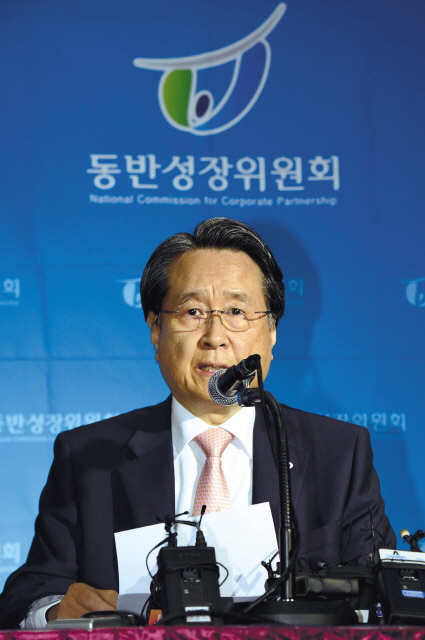8 firms get poor shared growth marks
Panel criticized for turning blind eye to foreign restaurant chains
By Korea HeraldPublished : May 28, 2013 - 09:46
Eight large companies including Homeplus, CJ O Shopping and STX Heavy Industries have received failing marks in promoting shared growth with smaller partner firms.
The National Commission for Corporate Partnership, which grades large businesses based on their efforts to seek coprosperity with small firms, announced on Monday the scores for 73 companies belonging to the country’s major conglomerates.
The National Commission for Corporate Partnership, which grades large businesses based on their efforts to seek coprosperity with small firms, announced on Monday the scores for 73 companies belonging to the country’s major conglomerates.

Kolon Global, Hyundai Homeshopping, Hyundai Department Store, KCC and LSIS also failed in the annual test.
Samsung Electronics, Samsung Electro-Mechanics, Samsung SDS, Hyundai Mipo Shipyard, Hyundai Heavy Industries, POSCO, SK Telecom, SK Global Chemical and SK C&C, on the other hand, earned “excellent” grades.
Twenty-nine companies including Hyundai Motor, Kia Motors, Doosan Heavy Industries & Construction, LG Electronics, Lotte Mart and Hanjin Heavy Industries got “satisfactory,” the second-best grade.
Twenty-seven firms including Daewoo Shipbuilding and Marine Engineering, Daelim Industrial, Dongbu Corporation, Cheil Industries, Hyundai Engineering & Construction and CJ CheilJedang received “average.”
The commission also accepted an adjusted draft by a subcommittee on the criteria for limiting conglomerates’ restaurant businesses.
Diners run by conglomerates and medium-sized companies are now allowed to open new stores only within a 100-meter radius from subway or railway stations in the Seoul metropolitan area. In other regions, the limit is 200 meters from stations.
In multipurpose facilities such as department stores, shopping arcades, and university and hospital buildings that house restaurants, big companies can open restaurants only if the facility is larger than 20,000 square meters. The limit is 10,000 square meters for medium-sized firms such as Nolbu.
Medium-sized companies that run only restaurants, however, cannot open new stores within 150 meters from small eateries that earn less than 48 million won ($42,800) in annual revenue.
The panel also recommended large companies to downsize their food catering and auto repairs businesses.
The commission said it did not add auto repairs to the list of trades allowed for only SMEs, however, as carmakers’ market share was less than 10 percent in the repairs business, contrary to the claims of small and medium-sized firms.
The panel’s chief Yoo Jang-hee said the number of large companies put to the test on partnership with small firms will increase to 109 next year.
“The point (of announcing the marks on shared growth) is not to tell who’s doing well and who’s not,” Yoo said.
“It is to see if the exemplar companies are living up to their commitment to shared growth.”
Regarding the commission’s recent designation of restaurants as SMEs-only trade, there has been much criticism over why foreign dining giants such as Pizza Hut, KFC and McDonald’s weren’t included as the big firms.
About 30 companies under Korean conglomerates including Shinsegae Food, Lotteria, CJ Foodville, Nongshim, Our Home, E-Land, Hanwha, Daesung and Maeil Dairies have been barred from opening new eateries more than 100 meters away from stations.
Some note that the panel intentionally excluded the foreign brands from the review to avoid international lawsuits over violation of the World Trade Organization’s rules or the Korea-U.S. Free Trade Agreement.
Pizza Hut and KFC belong to the world’s largest restaurant company Yum! Brands, Inc. Their annual global sales, combined with that of No. 1 fast-food chain McDonald’s, amount to over 50 trillion won.
The panel is also under fire for categorizing Outback Steakhouse, one of the world’s three largest dining firms, as a medium-sized company which is subject to milder regulations compared to CJ’s VIPS or E-Land’s Ashley.
The commission said it was requesting foreign firms such as Outback to comply with its latest recommendations although they did not take part in the review.
“Since big chains like Outback are hardly likely to open stores far away from stations, we don’t think their chances of violation are high,” said Kim Suh-yi, an official at the panel.
The panel’s “recommendations” are in fact regulations as companies that refuse to accept them are instructed by the Small and Medium Business Administration to “adjust” their business.
“We expect big firms including foreign ones won’t risk their reputation by facing business adjustments.”
Many industry watchers say it was also unfair of the commission to exclude Nolbu NBG, of which Morgan Stanley is the largest shareholder, from the regulations along with Theborn Korea, which runs Saemaeul Restaurants.
The two franchises’ stores together account for about half of the 2,000 eateries run by all 30 firms under the regulations.
By Kim So-hyun (sophie@heraldcorp.com)
-
Articles by Korea Herald



















